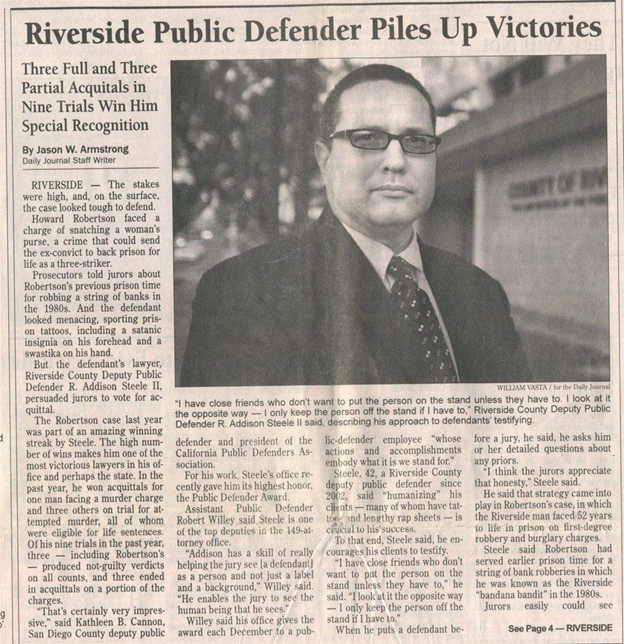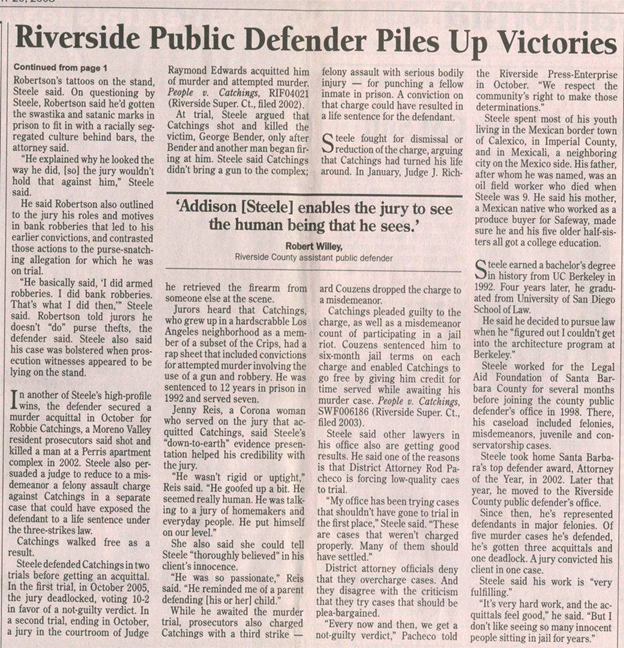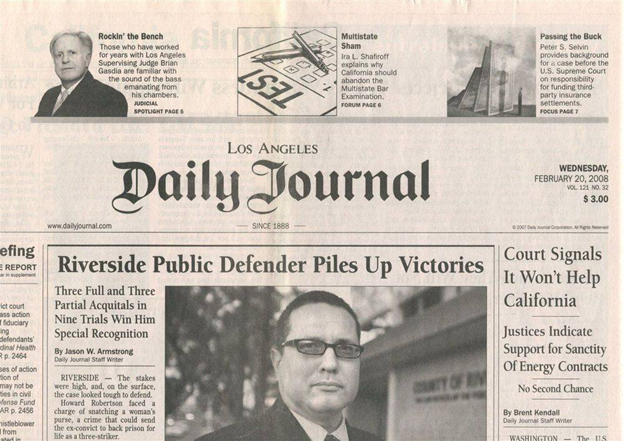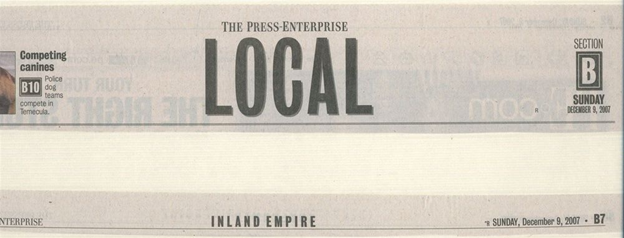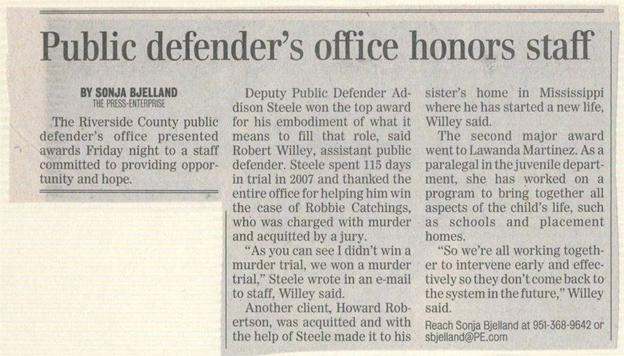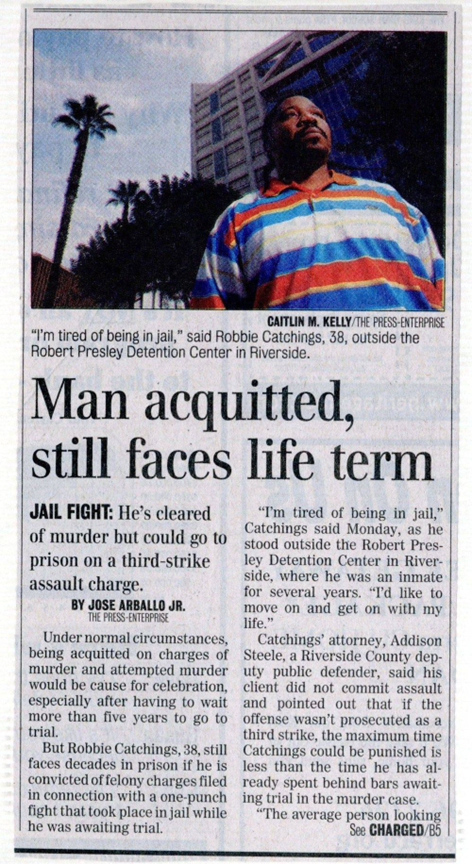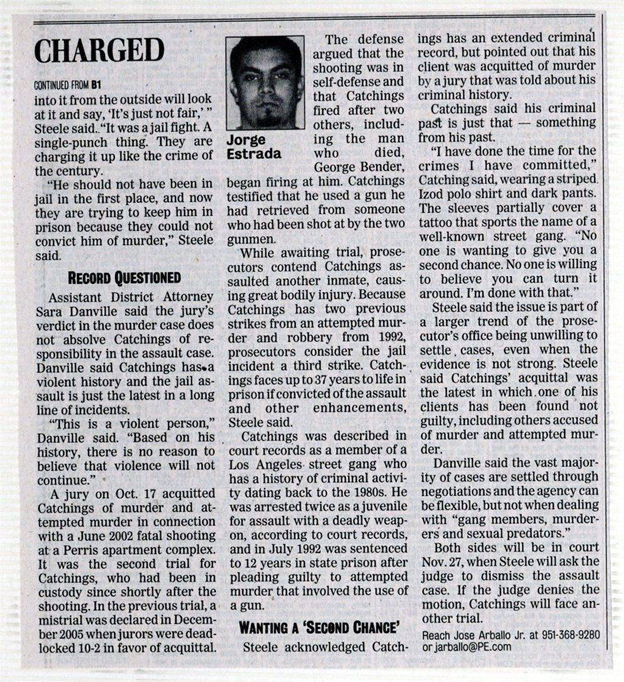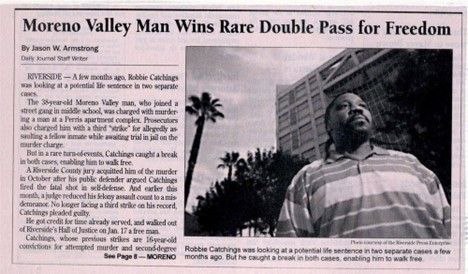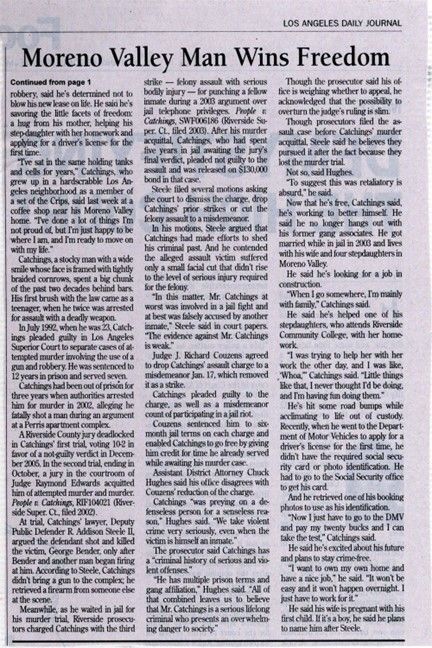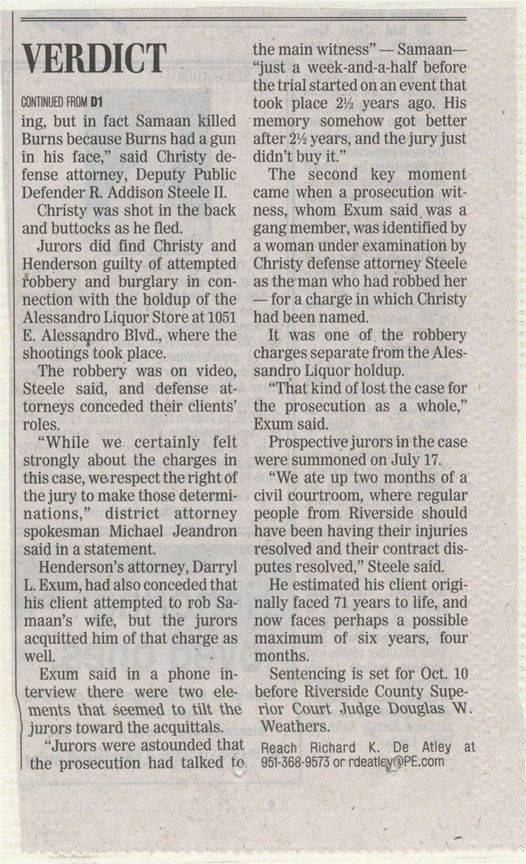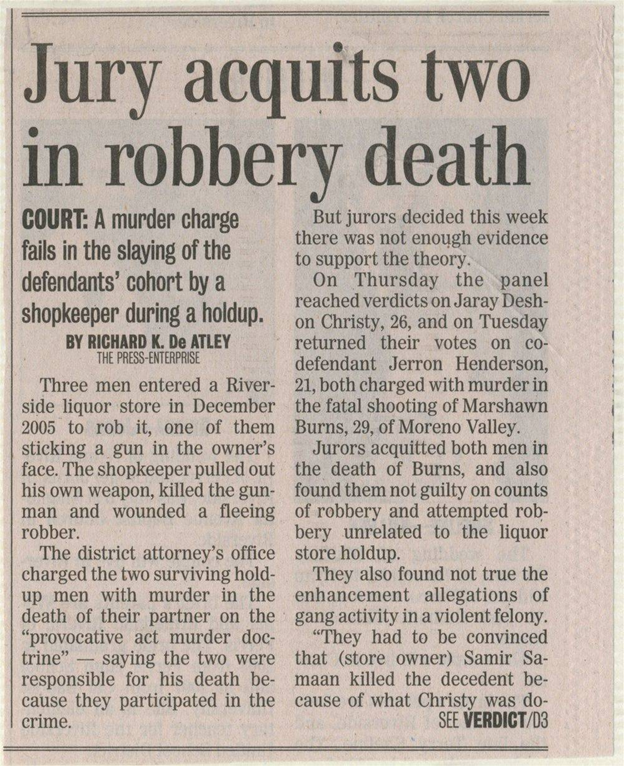Representation for Weapon Possession Cases in Santa Barbara County, California
Addison Steele has:
A possession of a weapon trial where the client was acquitted of the possession of a weapon charge
(Penal Code § 12020(a)(1))
(Adreian Jamison).
Possession of weapon cases can be difficult to defend because, typically, the authorities have the weapon. If you need to hire a lawyer for possession of weapon cases, you need a lawyer who has experience with possession of weapon trials and who has won possession of a weapon trial that has gone before a jury. I have done two possession of a weapon trials, I have had a full acquittal on the possession of a weapon count in one of the two possession of a weapon trials that I've done, and the possession of a weapon charge that I lost was on a conceded count in an attempted murder trial where I won the attempted murder charge.
Because the district attorney decides which cases go to trial, and most of the time, only cases with strong prosecution evidence go to trial, a defense attorney expects to win maybe one in ten trials. My record of trial wins in all cases far surpasses that, as it does in possession of a weapon case.
My weapons possession trial successes include:
Adreian Jamison
- Charges: Possession of crack cocaine for sales (Health and Safety Code § 11351.5), transportation of rock cocaine (Health and Safety Code § 11352(a)), possession of a weapon (a billy club) (Penal Code § 12020(a)(1), resisting arrest with force (Penal Code § 69), battery on a police officer (Penal Code § 243(b)) and destroying evidence (Penal Code § 135), special allegations of two prison term priors (Penal Code § 667.5(b) and two dope sales priors (Health and Safety Code § 11370.2(a)).
- Exposure: Adreian was facing fourteen years and four months in prison.
- Outcome: Adreian was acquitted of possession for sales, was convicted of the conceded lesser included offense of simple possession for personal use, convicted of transportation of crack cocaine, was
acquitted of possession of a billy club, was acquitted of resisting arrest with force, acquitted of battery on a police officer, and only convicted of the misdemeanor lesser included offense of resisting arrest and misdemeanor destroying evidence. He was sentenced to ten years in prison at half-time (he can get out in five years with good behavior).
Questions you should ask an attorney that you are considering hiring for a possession of a weapon case:
- Have you done a possession of a weapon trial before?
- This question is important because a trial of possession of a weapon is typically challenging because the authorities have the weapon.
- I have done two possession of a weapon trials.
- What were the results of your possession of a weapon trials?
- This question is important because, in possession of a weapon trial, there are so many ways to fight hard and beat the types of things that are typically part of a weapon charge, such as the weapon itself. If an attorney has won possession of a weapon trial, that attorney has the experience and skills to handle the level of complexity involved in possession of a weapon trial.
- I have had an acquittal in one of the two possession of weapon trials that I have done, and the one that I lost was conceded as part of an attempted murder trial in which I won the attempted charge. If you find another attorney who has done the number of possession of a weapon trials that I have done and has had more successful outcomes than I have, hire that person. If you want the best possible chance of not going to jail and potentially going home, you should contact me.
- Do you train other lawyers in your techniques for winning possession of weapon trials?
- This question is important because, typically, only the leading lawyers in a field are invited to conduct training of other lawyers.
- I was a speaker at the California Public Defenders Association (CPDA) homicide defense training in 2011 to train on my winning trials by humanizing the client method. I have also given that same training at the Riverside County Public Defenders Office, the Riverside County Barristers, the Santa Clara County Public Defenders Office, the Santa Barbara County Public Defenders Office, and the San Francisco County Public Defenders Office. I was a speaker at the CPDA homicide defense training in 2012 to train on utilizing a neuropsychologist in a homicide case. All these skills and techniques that I teach are easily utilized in possession of weapon trials.
- How long were the possession of a weapon trials you've done, and how many days of defense did you present?
- These questions are important because although some cases just call for a short trial, a short trial can also mean that the prosecution was not sufficiently challenged or that no defense was presented. Possession of a weapon trial that lasts five or so court days is the reason for concern because it's an indicator that the prosecution is not being thoroughly challenged and a complete defense is not being presented.
- I have spent twenty-seven court days in residential burglary trials. I have a success rate in residential burglary trials that is really unparalleled.
Felon in Possession of a Firearm or Ammunition
Four trials where the client was acquitted of all felon in possession of a firearm
or ammunition charges
(Penal Code §§ 12021(a)(1) and 12316(b)(1))
(Robbie Catchings, Jaray Christy, Ruben Tinoco, and James Kuzyk).
Three felon in possession of a firearm acquittals
(Penal Code § 12021(a)(1))
(Robbie Catchings and Jaray Christy with two).
One felon in possession of a firearm hung jury
(Penal Code § 12021(a)(1)
(Robbie Catchings)
Two felon in possession of ammunition acquittals
(Penal Code § 12316(b)(1))
(Ruben Tinoco and James Kuzyk).
Felons in possession of either a firearm or ammunition cases are extremely challenging because the fact that the client is a felon almost always comes into evidence.
I have done eight felons in possession of a firearm or ammunition trial, and I won the felons in possession charges in four of them and had a hung jury in one of them that was later a not guilty verdict. Of the nine felon-in-possession charges I've faced in trial, the district attorney was only able to get convictions in three of them.
My felon-in-possession trial successes are:
Robbie Catchings
- Charges: Murder (Penal Code § 187(a)), attempted murder (Penal Code § 664/187(a), felon in possession of a firearm (Penal Code § 12021(a)(1), special allegations of personal use of a firearm (Penal Code § 12022.53(d), a prison term prior (Penal Code § 667.5(b), serious crime prior (Penal Code § 667(a) and three prior strikes (Penal Code § 667(c)&(e)(2)/1170.12(c)(2)).
- Exposure: Robbie was facing 171 years to life in prison.
- Outcome: There were two trials; the first trial ended in a hung jury, with the jury deadlocked at ten to two for acquittal. At the second trial, Robbie was found
not guilty of all charges.
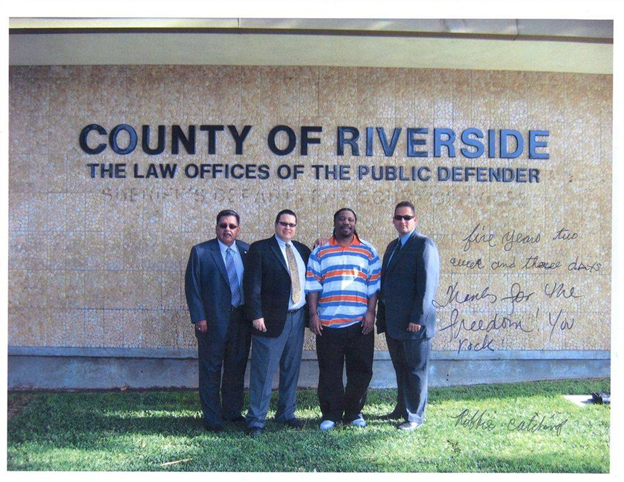
Robbie, Addison, and the investigators on the case after the verdict
Robbie was featured in an article in the Los Angeles Daily Journal that was done about my winning so many trials. I've been told, but have not been able to confirm, that the Los Angeles Daily Journal has never done an article like this about any other criminal defense attorney.
- Riverside Public Defender Piles Up Victories: Three Full and Three Partial Acquittals in Nine Trials Win Him Special Recognition, Jason W. Armstrong, Los Angeles Daily Journal, Volume 121, Number 32, February 20, 2008.
In another of Steele's high-profile wins, the defender secured a murder acquittal in October for Robbie Catchings, a Moreno Valley resident prosecutor said shot and killed a man at a Perris apartment complex in 2002. Steele also persuaded a judge to reduce to a misdemeanor a felony assault charge against Catchings in a separate case that could have exposed the defendant to a life sentence under the three-strikes law.
Catchings walked free as a result.
. . .
Jenny Reis, a Corona woman who served on the jury that acquitted Catchings, said Steele's 'down-to-earth' evidence presentation helped his credibility with the jury.
. . .
She also said she could tell Steele 'thoroughly believed' in his client's innocence.
'He was so passionate,' Reis said. 'He reminded me of a parent defending [his or her] child.'
In another of Steele's high-profile wins, the defender secured a murder acquittal in October for Robbie Catchings, a Moreno Valley resident prosecutor said shot and killed a man at a Perris apartment complex in 2002. Steele also persuaded a judge to reduce to a misdemeanor a felony assault charge against Catchings in a separate case that could have exposed the defendant to a life sentence under the three-strikes law. Catchings walked free as a result.
. . .
Jenny Reis, a Corona woman who served on the jury that acquitted Catchings, said Steele's 'down-to-earth' evidence presentation helped his credibility with the jury.
. . .
She also said she could tell Steele 'thoroughly believed' in his client's innocence.
'He was so passionate,' Reis said. 'He reminded me of a parent defending [his or her] child.'
Robbie was also featured in a newspaper article covering when I was named Riverside County Public Defenders Office Attorney of the Year.
- Public defender's office honors staff, Sonja Bjelland, The Press-Enterprise, Local B7, December 9, 2007.
"The Riverside County public defender's office presented awards Friday night to a staff committed to providing opportunity and hope.
Deputy Public Defender Addison Steele won the top award for his embodiment of what it means to fill that role, said Robert Willey, assistant public defender. Steele spent 115 days in a trial in 2007 and thanked the entire office for helping him win the case of Robbie Catchings, who was charged with murder and acquitted by a jury.
'As you can see, I didn't win a murder trial, we won a murder trial,' Steele wrote in an e-mail to staff, Willey said."
The newspaper article covering when I was named Riverside County Public Defenders Office Attorney of the Year.
- After we won the murder trial, the district attorney tried to give Robbie a life in prison sentence because he was a third striker and had gotten in a jail fight while he was waiting for his trial when he was acquitted of all charges. I filed a series of motions, including a bail motion when they tried to have Robbie sent back to jail, a motion to dismiss the jail fight case, a motion to strike the strike priors, and a motion to reduce the charge to a misdemeanor. The judge reduced the case to a misdemeanor. Robbie pled guilty to the misdemeanor for credit for time already served, and it was finally all over. Robbie was able to go home and take care of his ailing mother.
The first newspaper article was about the district attorney trying to give Robbie a life sentence after they lost his murder trial.
An interesting side note about this article is that Jorge Estrada, whoever he is, had absolutely nothing to do with the case; his picture in the article is a copy editor's mistake.
This is the newspaper article that covered when Robbie and I beat the district attorney's attempt to give Robbie a life sentence after we had won the murder trial.
The Los Angeles Daily Journal article covering Robbie and Addison's three strikes victory.
The Los Angeles Daily Journal article covers the district attorney's failed attempt to give Robbie a life in-prison sentence after he and Addison won his murder trial.
Jaray Christy
- Charges: Murder (Penal Code § 187(a)) with a gang allegation (Penal Code § 186.22(b)) personal use of a gun (Penal Code § 12022.53(b) and gun use in a gang crime (Penal Code § 12022.53(e)), two counts of attempted robbery (Penal Code § 664/211) with gang allegations (Penal Code § 186.22(b)), gun use in a gang crime (Penal Code § 12022.53(e) and personal use of a gun (Penal Code § 12022.53(b)), two counts of felon in possession of a firearm (Penal Code § 12021(a)(1)), five counts of robbery (Penal Code § 211) with gang allegations (Penal Code § 186.22(b) and gun allegations (Penal Code § 12022(a)(1)).
- Exposure: Jaray was facing seventy-one years to life in prison.
- Outcome: Jaray was only convicted of a few charges, all of which were conceded to the jury because they were on videotape. He was acquitted of first-degree murder and the lesser degree of second-degree murder.
He was acquitted of all personal use of a firearm charges and was acquitted of all possession of firearms charges. He was acquitted of all gang charges and allegations. He was sentenced to four years and eight months in prison. He served that time and went home. He is now going to school and writing screenplays.
The newspaper article covering Jaray and Addison's victory.
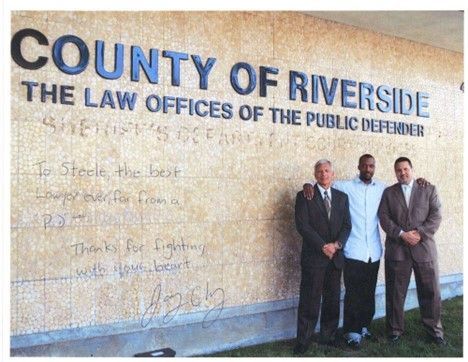
Jaray, Addison, and the investigator on the case after the verdict.
Ruben Tinoco
- Charges: Possession of methamphetamine for sales (Health and Safety Code § 11378), felon in possession of ammunition (Penal Code § 12316(b)(1)) and possession of drug paraphernalia (Health and Safety Code § 11364), with two strike priors (Penal Code § 667(c)&(e)(2)(A)/1170.12(c)(2)).
- Exposure: Ruben was facing fifty years to life in prison.
- Outcome: The jury found Ruben not guilty of felon in possession of ammunition and possession of drug paraphernalia; the jury hung eleven to one in favor of acquittal on the possession of methamphetamine charge. The case later settled for Ruben pleading guilty to simple possession of methamphetamine, and the district attorney dismissed one of the strikes, and Ruben was sentenced to two years and eight months in prison.
The verdict forms and Minute Order was where Ruben was saved from a prison sentence of fifty years to life and was sentenced to only two years or eight months.
James Kuzyk
- Charges: Manufacturing methamphetamine (Health and Safety Code § 11379.6(a)), possession of ingredients for manufacturing methamphetamine (Health and Safety Code § 11383(c)(1)), and felon in possession of ammunition (Penal Code § 12316(b)(1)).
- Exposure: Three years in prison for the felon in possession of ammunition.
- Outcome: James was acquitted of felon in possession of ammunition; he was convicted of the other charges.
Questions You Should Ask an Attorney That You Are Considering Hiring for a Felon in Possession Case:
- Have you done a felon in possession trial before?
- This question is important because a felon in possession trial is a highly prejudicial and unique type of trial. It requires specialized knowledge and experience.
- I have done eight felon in possession trials.
- What were the results of your felon in possession trials?
- This question is important because in a felon in possession trial the attorney needs to be aggressive, usually with a cop witness, if an attorney is winning felon in possession trials, the attorney has the experience and skills to handle the level of complexity involved in a felon in possession trial.
- I have had four trial where I beat all the felon in possession counts and another trial with a hung jury on the felon in possession count. If you find another attorney that has done the number of felon in possession trials that I have done and has had more successful outcomes than I have had, hire that person. If you want the best possible chance of winning, you should contact me.
- Do you train others lawyers in your techniques for winning felon in possession trials?
- This question is important because typically only the leading lawyers in a field are invited to conduct trainings of other lawyers.
- I was a speaker at the California Public Defenders Association (CPDA) homicide defense training in 2011 to train on my winning trials by humanizing the client method. I have also given that same training at the Riverside County Public Defenders Office, the Riverside County Barristers, the Santa Clara County Public Defenders Office and the San Francisco County Public Defenders Office. I was a speaker at the CPDA homicide defense training in 2012 to train on utilizing a neuropsychologist in a homicide case. The skills I teach other lawyers are easily utilized in felon in possession trials.
- How long were the felon in possession trials you've done and how many days of defense did you present?
- These questions are important because although some cases just call for a short trial, a short trial can also mean that the prosecution was not sufficiently challenged or that no defense was presented. A felon in possession trial that lasts five or ten court days is reason for concern because it's an indicator that the prosecution is not being thoroughly challenged and a complete defense is not being presented.
- I have spent 149 court days in felon in possession trials. I have success rate in felon in possession trials that is really unparalleled.
CONTACT INFORMATION
Phone: (805) 995-9368
Email: addison@steelelawfirmsb.com
Address: 1226 1/2 State St., Suite 2, Santa Barbara, CA 93101

